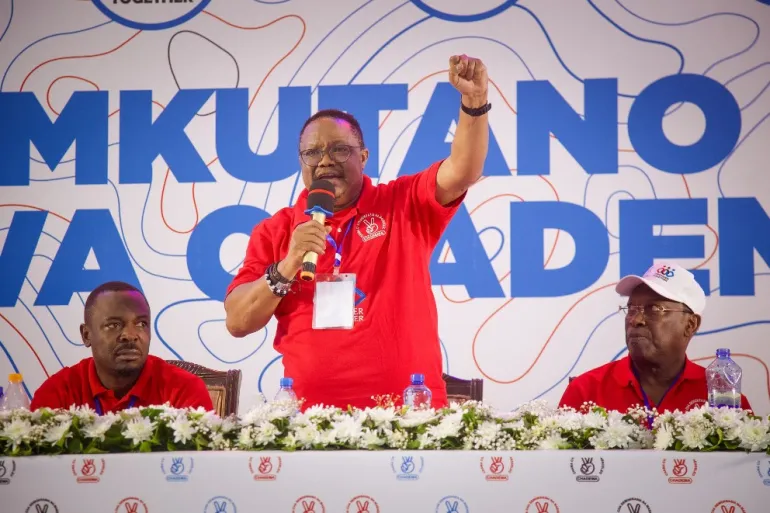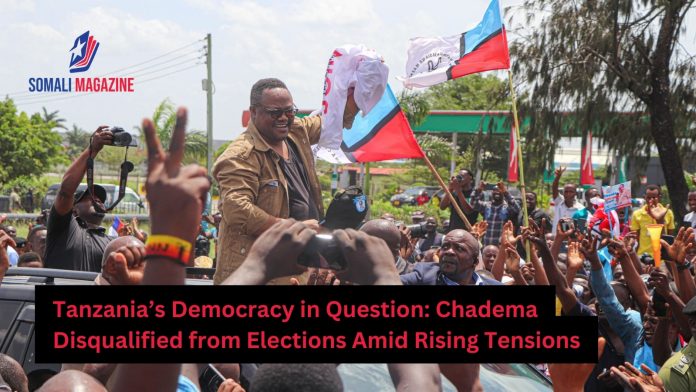Facebook Twitter Instagram Somali Magazine - People's Magazine
Tanzania’s main opposition party, Chama cha Demokrasia na Maendeleo (Chadema), has been officially disqualified from participating in the country’s upcoming presidential and parliamentary elections, sparking widespread criticism and raising concerns about the state of democracy in the East African nation. The decision, announced on April 12, 2025, by the Independent National Elections Commission (INEC), comes just days after Chadema’s leader, Tundu Lissu, was charged with treason.
INEC cited Chadema’s failure to sign a mandatory electoral code of conduct as the reason for its disqualification. According to Ramadhani Kailima, INEC’s director of elections, the code of conduct is a legal requirement for all political parties intending to field candidates in the October elections. “Any party that did not sign the code of conduct will not participate in the general election,” Kailima stated, adding that the ban extends to all by-elections until 2030.
Chadema, however, has defended its decision not to sign the document, arguing that the electoral process is fundamentally flawed and heavily biased in favor of the ruling Chama cha Mapinduzi (CCM) party. The opposition party had previously threatened to boycott the elections unless significant reforms were implemented to ensure fairness and transparency. Chadema Secretary-General John Mnyika reiterated the party’s stance, stating, “We will not participate in any election without substantial reforms to the country’s electoral laws and processes.”
The disqualification of Chadema has intensified scrutiny of President Samia Suluhu Hassan’s administration, with rights groups and opposition figures accusing the government of cracking down on dissent. Lissu, a former presidential candidate and vocal critic of the CCM, was charged with treason on April 10, accused of inciting rebellion and attempting to disrupt the elections. Prosecutors allege that Lissu called on the public to prevent the vote from taking place, a charge that carries the possibility of a death sentence. Lissu has not been allowed to enter a plea, and his case has been adjourned until April 24.
The exclusion of Chadema from the elections has drawn condemnation from human rights organizations and international observers, who warn that the move undermines political pluralism and democratic principles. Critics argue that the disqualification is part of a broader pattern of repression targeting opposition parties and activists. Reports of unexplained abductions and killings of political figures have further fueled concerns about the government’s commitment to upholding human rights.

President Hassan’s government has denied the allegations, maintaining that it respects human rights and the rule of law. CCM officials have dismissed claims of electoral manipulation, insisting that the disqualification of Chadema was a result of the party’s own actions. “The government has no role in this decision. It is a matter of law and procedure,” a CCM spokesperson stated.
The disqualification has also sparked protests among Chadema supporters, who view the move as an attempt to silence dissent and consolidate CCM’s grip on power. Demonstrations have been reported in several regions, with protesters calling for electoral reforms and the release of Lissu. Security forces have been deployed to maintain order, and authorities have warned against unauthorized gatherings.
As Tanzania prepares for the October elections, the disqualification of its main opposition party raises critical questions about the country’s democratic trajectory. Analysts warn that the exclusion of Chadema could lead to voter apathy and undermine the legitimacy of the electoral process. The international community has called for dialogue and reforms to ensure a level playing field for all political actors.
The unfolding political crisis in Tanzania highlights the challenges of balancing stability and democratic governance. As the nation navigates this contentious period, the focus remains on fostering an inclusive and transparent electoral process that reflects the will of the people.

